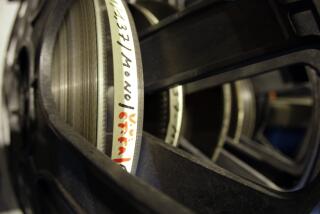Oh, the Horrors
- Share via
Among the films in the American Cinematheque’s second annual Festival of Fantasy, Horror & Science Fiction Festival is Damiano Damiani’s 1966 “The Witch” (tonight, following the 7 p.m. screening of “The Innocents”). “The Witch” is an extravagantly demented tale about a handsome, arrogant man (Richard Johnson) who answers an ad for a job editing a deceased general’s memoirs. He arrives at a vast, crumbling Roman palace, where he insults the general’s widow, an exotic, severe-looking Spanish countess (Sarah Ferrati) by making it clear that he’s no gigolo. He’s soon bewitched, however, by the general’s glamorous, teasing daughter (Rosanna Schiaffino).
A delirious reworking of “Sunset Boulevard”--although actually based on Carlos Fuentes’ novel “Aura”--as a fantasy of supernatural horror, it exudes the fascination of the absurd when made with conviction. Damiani has been accused of misogyny over the years, and it’s easy to see why.
Screening Friday at 9:30 p.m. is Mario Bava’s “Hercules in the Haunted World” (1961). Bava (1914-1980) is a cult favorite, a former cinematographer admired for his visual flair, who made a splash with his debut feature “Black Sabbath” (1961). “Hercules” was his fourth film in his first year as a director. Bava has been credited with bringing a tongue-in-cheek approach to his horror and muscleman epics, but his “Hercules” plays and looks like an old-fashioned comic book. Bava does have a stylish sense of atmosphere, especially in lighting, but not enough here, except for the most die-hard fans, to offset elementary dubbed English dialogue and wooden acting.
The gist of a hazy narrative is that Hercules (British bodybuilder Reg Park, who has been cited by Arnold Schwarzenegger as a boyhood inspiration) must make a perilous journey through Hades to obtain a magic stone that will free his beloved (Leonora Ruffo) from a spell cast by evil ruler Christopher Lee. It’s followed by Bava’s “Planet of the Vampires” (1966).
It has been aptly suggested that were Ken Loach or Mike Leigh to make a horror picture it would be something like Andrew Robinson’s astonishing “Dead Creatures” (Saturday at 5 p.m.). Like Loach and Leigh, Robinson focuses on those living on the lowest rungs of the socioeconomic ladder. The lives of the young women he depicts, however, have been marginalized not by class or poverty but because they’ve fallen victim to some mysterious disease that forces them to become cannibals to stave off the rotting of their own flesh. They band together, moving from one dreary flat to another, to avoid detection and help each other from behaving in an uncontrolled manner.
They are fighting a losing battle and know it: Soon they’ll start losing their minds and start rotting away no matter how much human flesh they consume. In the meantime they try hard to make the best of their bizarre, horrendous predicament, enjoying camaraderie among their kind and fancying boys like any other girls. There’s absurdity yet heroic gallantry in their determination to keep their humanity. In the meantime, their stories are punctuated by cuts to a middle-aged man who abducts, imprisons, interrogates and eventually slays a series of young men.
As gruesome as “Dead Creatures” is, the film is more allegory than gore: The young women, who have only their loyalty to each other to sustain them, are symbolically rotting away from a society indifferent to their fate. Lloyd E. Rigler Theater at the Egyptian, 6712 Hollywood Blvd. (323) 466-FILM.
*
Krzysztof Zanussi’s “Life as a Fatal Sexually Transmitted Disease” launches the Laemmle Theaters’ latest World Cinema weekend morning series Saturday and Sunday at 10 at the Sunset 5. Poland’s official entry in the last Oscars, the film reunites Zanussi with Zbigniew Zapasiewicz, the star of “Camouflage” (1976), one of the director’s finest films, in which Zapasiewicz played a brilliant and treacherous academic.
This time he’s a stocky, silver-haired, 60ish physician. A man with a taste for bitter irony, he confronts mortality and discovers within himself an unexpected spirituality and generosity while nonetheless meeting his fate on his own rigorous terms. Zapasiewicz is as compelling a presence as ever, and this contemplative film is one of Zanussi’s best. It also screens Aug. 25 and 26 at 11 a.m. at the Monica 4-Plex. Sunset 5, 8000 Sunset Blvd., (323) 848-3500; Monica 4-Plex, 1332 2nd St., Santa Monica, (310) 394-9741.
*
The Sunset 5 launches new midnight movies Friday and Saturday in an open-ended run, a work of Japanese anime, Hiroyuki Kitakubo’s “Blood: The Last Vampire.” In an evocative film-noir atmosphere rendered in a sleek, stunning photorealistic style, an enigmatic, somber and androgynous-looking girl, Saya, is on a mission to destroy vampires on an American military base, already nervous about the imminent Vietnam War. Read what you will into this eerie, compelling work. (323) 848-3500.
*
LACMA’s “The Minister of Fear: Fritz Lang in America” continues Friday at 7:30 p.m. with “Human Desire” (1954) and “Clash by Night” (1952) and Saturday at 7:30 p.m. with “Scarlet Street” (1945) and Jean Renoir’s “La Chienne” (1931), upon which “Scarlet Street” is based; Bing Theater, 5905 Wilshire Blvd., (323) 857-6010.
Meanwhile, the Silent Movie, 611 N. Fairfax Ave., is screening Lang’s “Metropolis” (1926) Friday, Saturday and Sunday at 8 p.m., with screenings at 1 p.m. and 4 p.m. on Sunday only; accompanied by Ed Sussman on the theremin; (323) 655-2520. LACMA screens “Metropolis” Sept. 29 as part of its “Fritz Lang in Germany” series, which runs Sept. 28 through Oct. 13.
More to Read
Only good movies
Get the Indie Focus newsletter, Mark Olsen's weekly guide to the world of cinema.
You may occasionally receive promotional content from the Los Angeles Times.






